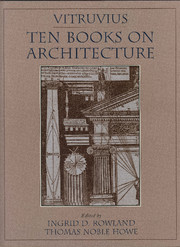Book contents
- Frontmatter
- Dedication
- Contents
- Acknowledgments
- List of Illustrations
- Translator's Preface
- Illustrator's Preface
- VITRUVIUS
- INTRODUCTION
- LIST OF MANUSCRIPTS SEEN
- THE TRANSLATION
- Book 1 First Principles and the Layout of Cities
- Book 2 Building Materials
- Book 3 Temples
- Book 4 Corinthian, Doric, and Tuscan Temples
- Book 5 Public Buildings
- Book 6 Private Buildings
- Book 7 Finishing
- Book 8 Water
- Book 9 Sundials and Clocks
- Book 10 Machines
- COMMENTARY
- Index
Book 3 - Temples
Published online by Cambridge University Press: 18 December 2014
- Frontmatter
- Dedication
- Contents
- Acknowledgments
- List of Illustrations
- Translator's Preface
- Illustrator's Preface
- VITRUVIUS
- INTRODUCTION
- LIST OF MANUSCRIPTS SEEN
- THE TRANSLATION
- Book 1 First Principles and the Layout of Cities
- Book 2 Building Materials
- Book 3 Temples
- Book 4 Corinthian, Doric, and Tuscan Temples
- Book 5 Public Buildings
- Book 6 Private Buildings
- Book 7 Finishing
- Book 8 Water
- Book 9 Sundials and Clocks
- Book 10 Machines
- COMMENTARY
- Index
Summary
PREFACE: JUDGMENT OF ARTISTIC SKILL
1. Apollo of Delphi proclaimed in an oracle of the Pythian priestess that Socrates was the wisest man of all. Socrates, in turn, is recorded as having said, sensibly and knowledgeably, that human hearts should have been transparent and open, so that their feelings are not hidden, but rather open for inspection. Indeed, if only Nature had followed his advice, and had made them clear and open to view! In that case, not only would the praiseworthy qualities and the shortcomings of human souls be observable at close range, but, in addition, knowledge of the various disciplines, set out before our own eyes, would no longer be put to the test by uncertain judgments; instead, the truly learned and truly wise would acquire a preeminent, unshakable authority.
Yet because things have not been set up this way, but rather according to the will of Nature, it is not possible for men to judge the state of the knowledge of the arts that lies hidden within, because talent is concealed in darkness in men's breasts. Although artists themselves might profess their good judgment, if they are not wealthy, or well known because their shop is of long standing, and are unequipped with influence in the Forum and skill in public speaking, they cannot muster such authority with regard to their skill that what they profess to know will be believed.
2. We can observe this above all in the case of the ancient sculptors and painters, because those among them who had conspicuous position and the benefit of patronage are the ones who have been eternally commemorated to posterity, those like Myron, Polycleitus, Phidias, Lysippus, and the rest who achieved fame through their art.* As they executed their works for great cities, or kings, or prominent citizens, so, too, they acquired their great reputations.
- Type
- Chapter
- Information
- Vitruvius: 'Ten Books on Architecture' , pp. 46 - 53Publisher: Cambridge University PressPrint publication year: 1999



